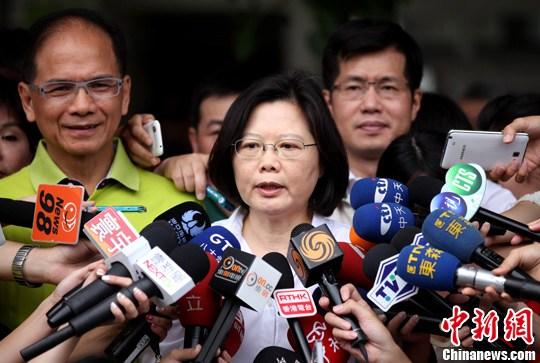Taiwan's elections and the cross-Strait relations
- By Ge Hongliang
 0 Comment(s)
0 Comment(s) Print
Print E-mail China.org.cn, February 11, 2016
E-mail China.org.cn, February 11, 2016
|
Democratic Progressive Party chairwoman Tsai Ing-wen [Chinanews.com] |
Taiwan's leadership and legislative elections ended on January 16 with the ruling Kuomintang (KMT) losing the former by three million votes to the opposition Democratic Progressive Party (DPP) in the former and being almost trounced in the latter.
Since 2008, the KMT had made obvious contributions to the peaceful development of cross-Strait relations, but the election results show it needs to do more in the area of elective politics on the island, which is an issue commonly faced by Taiwan's political parties.
Why the KMT suffered such humiliating defeat has become a hot topic in academic and media circles. To regain its ruling status, the KMT needs to have a better understanding of public opinion and win the support of the majority of people. This defeat shows it has "lost the ardent support of the people".
Since it failed to fulfill promises made when taking office, the people have nursed many grievances and thus demanded a change in the status quo.
Take economic development for an example. Ma Ying-jeou put forward the so-called "633 Plan" which promised an overall economic growth rate of 6 percent, per capita GDP growth of 3 percent, and holding unemployment to 3 percent. None of these targets were achieved.
Statistics show that during Ma Ying-jeou's first term from 2008 to 2011, the economic growth rate in Taiwan averaged 3.39 percent. In his second term, the figure fell to about 2.31 percent. In 2015, the figure had fallen even more sharply to an estimated 1.06 percent from 4 percent in 2014.
In 2011 before Ma Ying-jeou ended his first term, Taiwan's per capita GDP stood at US$21,000 compared to US$17,596 in 2007. However, by 2013 the figure had dropped to US$20,930, the lowest among the "Asia's Four Little Dragons" - Hong Kong, Singapore, South Korea and Taiwan. The current overall unemployment rate in Taiwan is 4 percent, while the rate among young workers is surprisingly high to about 12 percent, a large number holding masters and doctoral degrees.
Not surprisingly, Ma Ying-jeou's support rate had continuously declined, with the figure standing at only 9 percent in 2013. Local media published articles saying he should assume responsibility.
KMT's incapability to handle economic affairs over the past eight years has highlighted the problems related to the people's livelihood and certainly aggravated their discontents. The people's demand for a change in political power helped Tsai Ing-wen win the election to a certain extent. The economic factor was confirmed in post-election opinion polls. The issue of cross-Strait relations was little mentioned.




Go to Forum >>0 Comment(s)